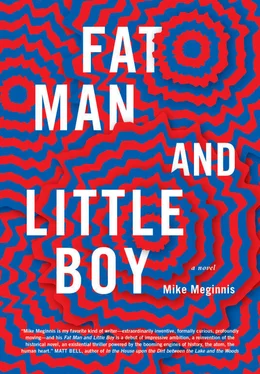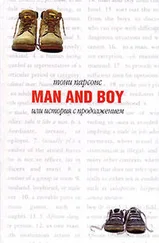What good are hogs alone, Little Boy wonders.
He sees his brother’s face in a hog’s face. Neither of the brothers has ever looked directly into a mirror. Little Boy’s face might be the same. Fat Man may not know his own resemblance to the hogs. Or he might guess.
The father’s pulling red-tinged strings of mucus from between his fingers and flicking-flinging them away. He begins to pile the sows’ corpses, dropping them one by one onto something like a wheelbarrow, a flat wooden platform perched on two tin legs and a tin wheel.
The daughter shrieks. There’s a growing wet stain on the back of her blue robe. Briny water trickles from between her legs. The mother assaults her with questions while the daughter fights a swoon. Her water has broken.
The mother says, “Come inside, or you’ll give the pigs a meal.” She takes her daughter by the hand and rushes her into the house.
The piglets that live have begun to crowd the brother bombs, again oinking at their ankles.
“The pigs must think you are their fathers,” says the father, laughing a sour laugh. The sound dies in his throat. A darkness passes over his face. He understands something that he did not before. The hog shadows grow longer; the animals themselves do not move. The piglets oink and squeal. The father turns away from the brothers. They don’t know what he said. They don’t know what he understands.
The father wheels the piled sow bodies to the home, where he takes them on his shoulders and carries them through the door. As the paper door slides closed Little Boy glimpses mother and daughter inside the home. Mother sets down a short, broad wooden bucket. The daughter watches her, shakes her head, and whispers painful secrets. She clutches her robe—gathered up in her fists so that her strong young thighs the color of moon are exposed—and presses it between her legs as if to staunch the flow. The mother comes to the door. She closes it, glaring at the brother bombs. The daughter is staring into the wooden bucket, and then she is bisected by the closing door, and then she is gone.
Little Boy looks at the pile of unfinished pigs in the muck and muck and muck of the pen. They are weird lumps of raw, misshapen meat, almost certainly inedible. He wonders, Do they have bones?
He says to Fat Man, “Carry me,” and, before his brother can object, leaps into his arms. Fat Man stumbles back a little. He tries his best not to kick any babies as he walks them toward the house. The oinklings follow. The hogs lie down in the filth; several loll onto their sides.
The mother sits behind the daughter. The daughter, now naked, squats over the pail, her heels butting up against either side, her legs already trembling. Her breasts are painful-looking—sharp, high fistfuls that seem to be ever and constantly squeezed, even now, by the hands that made them. A thin red stream like razor wire falls between her legs, though it does not seem to fall but rather to hold fast, like a measure of yarn connecting her body to the water below. In the water the red is murk. Marbles clarity with unclarity.
The mother is massaging her daughter’s abdomen. She pushes and prods with her fingers, and the flesh turns ivory white where she presses, and pink around the white, like burning film. The mother’s legs splay out around the daughter. They can see the hard, cracked skin lined with dirt on the soles of her feet. They cannot see the mother’s face.
They can hear the mother screaming at them. They do not know what she says.
They know exactly what she means. “GET OUT!” she is saying. “GET OUT!” They cannot see the father, but hear him in the room like a kitchen, butchering sow bodies.
The red yarn between the daughter’s legs is cut. Droplets fall, then nothing.
Fat Man closes the door. The brother bombs sit down among adoring piglets.
They sit against the house. The piglets are curled up against them asleep, or they are sitting in their laps, or they are sniffing all about their shoes. There is one sitting on the cash case. If they are awake they are looking at the brother bombs, contemplating their vastness through puckered piggy eyes. Inside the home the daughter cries for mercy. It’s been maybe an hour. Little Boy circles his finger in the dirt. He draws clouds.
“Do you think they knew she was pregnant?” says Little Boy.
“I’m not sure she knew,” says Fat Man.
Little Boy holds his tongue. She knew something . He thinks of his hand on her stomach, her hand pressing his, the heat of her body, and the ruckus inside. He remembers the mother squatting on the toilet as her daughter squats now in what is like the living room. He remembers the frenzy of the pigs, their midnight meal, a feast of night soil. It all must be connected but the only connection he can find is that he saw all of these things. They listen to the rising symphony of crickets, to the farrowing daughter, the butchering father.
Fat Man lifts a baby pig to look in its eyes. “Do you think she’ll be all right?”
Little Boy doesn’t answer.
“Why do the little pigs know who we are and not the big ones?” says Fat Man. “And if they know us, then why do they love us?” He sets down his pig and looks at his black palms. “How can they love us?”
“This is love?” says Little Boy.
“Who knows what pigs feel?” What he means to say is, Yes.
The daughter weeps. The mother is crying now too. They hear one savage chop as the father embeds his knife in the block’s corner and then nothing, footsteps, nothing, wailing, wailing.
The father comes out with a baby. It is a soft thing, unfinished like the pigs, and seems to have too little skin—the elbows won’t straighten; the toes curl in, and express themselves mostly as lumps in footflesh; the chin tucks into the collarbone. The fingers flex and squeeze like hungry claws. The father puts the baby in Fat Man’s hands. He says, “Somehow this is your fault.” For a moment Fat Man thinks he might know what was said.
The baby grabs Fat Man by the lapels of his suit and pulls. It burbles stupidly, its throat raw from crying, too weak now for the life ahead. Spit bubbles in the corners of its mouth. Its eyes are like wet marbles.
Fat Man burbles at the baby. He gives it one of his fingers to clutch.
“It doesn’t look quite right,” says Little Boy.
“Maybe this is how Japanese babies look when they’re fresh from the oven.”
“It makes me think of the pigs.”
“I can’t think who would be the father,” says Fat Man. “I haven’t seen her with any men, other than her own father.”
“And you,” says Little Boy.
“I hardly count.”
The father returns to the wailing house.
Little Boy pats the baby’s tummy. There is something familiar in the child’s dumb gaze.
The next time the father comes out, there’s a second baby in his hands. This one is smaller, grayer, and still. He hands the body to Little Boy. The head falls back from the body, exposing what is like a neck. The eyes are closed, the mouth half open.
The father watches him hold the baby and waits, as if expecting Little Boy to say something. As if Little Boy will confess to the murder. Little Boy shrugs. So does Fat Man.
“Are the women all right?” asks Fat Man.
The father goes back into his home. The brother bombs are left to watch their babies.
Fat Man’s child alive and Little Boy’s dead.
Little Boy says, “I don’t think mine is breathing.” He concentrates on the face of the baby, watching for the slightest hint of motion. “Why’d he give me this one?”
Inside the home the family is quiet like dead things are quiet.
Inside the home it is dark. There are the ripe smells of open bodies. The women must be in what is like the kitchen. They have left their pail, which brims with things that came from inside them. Fat Man sets his baby in a blanket. Little Boy is still trying to read the dead thing in his hands. The kitchen wall slides open. The father stands naked in shadow, half-butchered pigs piled on the table behind him, an iron cleaver in his hand. His bones show through his skin like actors behind curtains. His penis is long and thin like some sickly root. They cannot see his eyes.
Читать дальше












